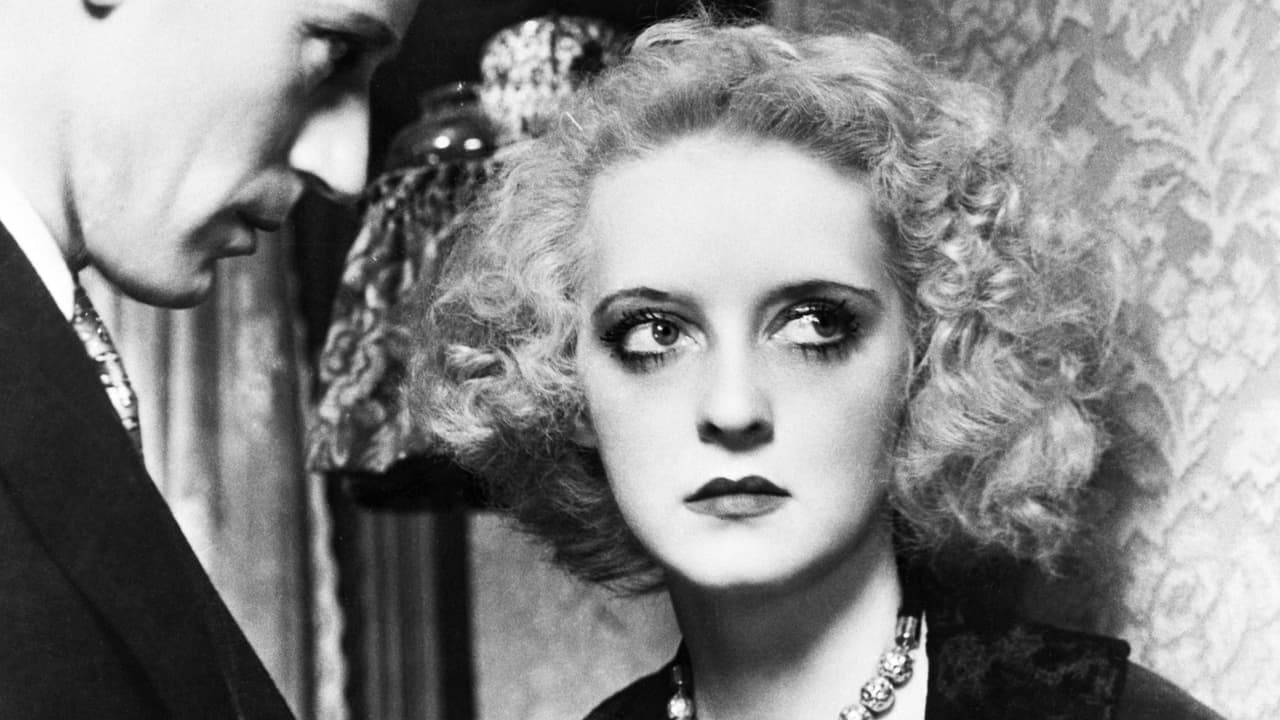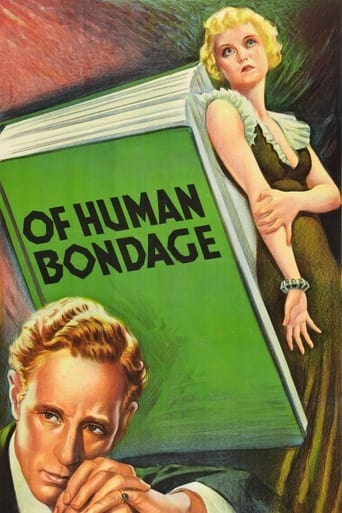

It's a little hard to watch this one, just as it was a little hard to read the novel by W. Somerset Maugham. Leslie Howard plays the sensitive, club-footed young man who falls for a lower-class, vulgar woman who manipulates and exploits him time and time again. Bette Davis plays the woman brilliantly, and for her performance I could have notched up my rating half a star. The movie has one scene worth watching in particular – the one where she viciously rips into him after he tells her that she disgusts him. Her response: "Me?! I disgust you? You, you, you're too fine! You'll have none of me, but you'll sit here all night looking at your naked females...You cad! You dirty swine! I never cared for you, not once. I was always makin' a fool of ya. You bored me stiff! I hated ya! It made me sick when I had to let ya kiss me. I only did it because ya begged me. Ya hounded me and drove me crazy! And after you kissed me, I always used to wipe my mouth! WIPE MY MOUTH! I made up for it. For every kiss, I had a laugh. We laughed at ya, Miller and me, and Griffith and me, we laughed at ya! Because you were such a mug, a mug, a mug! You know what you are? You gimpy-legged monster? You're a cripple! A cripple! A cripple!" Despite that, he STILL returns back to her (arrgh), which is disagreeable to watch, even though he has a benign acceptance about being doomed to love her, just as a much friendlier woman is doomed to love him. And so it goes. The movie would firmly establish Bette Davis as an actress, and rightfully so, though she was snubbed by the Academy. I found it interesting to read later that there was such an uproar over it that the Academy president said write-in votes could be cast, and Davis received enough to finish ahead of one of the nominees, but not enough to beat Claudette Colbert who would win for 'It Happened One Night' (the process would be changed the following year). Unfortunately, Davis can't completely overcome the masochism of the story, or Leslie Howard's somewhat wooden performance.
... View MoreA young man finds himself attracted to a cold and unfeeling waitress (Bette Davis) who may ultimately destroy them both.While I am not familiar with the original book (blasphemy?), I thought this was a pretty decent film. The man with clubfoot who is treated poorly by society, possibly even within the medical profession. His friends and colleagues, and even his own supposed girlfriend, treating him like dirt.A younger Bette Davis leads the way, with many saying she deserved an Oscar for this. That may well be true. Not to be superficial, but it is interesting to note that her "Bette Davis eyes" make her look exotic, which would actually work against her later in life. She did not age gracefully.
... View MoreMuch has been said regarding Bette Davis's outbreak performance in "Of Human Bondage" and I would certainly never argue it - her acting is magnificent. As is Leslie Howard's ....the two play off of each other perfectly - Howard as the shy, introverted and self-conscious "lonely man" and Davis as the brash, insensitive and malicious waitress. But it's the message of this movie that is so powerful, Davis and Howard are simply the messengers, albeit great ones."Of Human Bondage" is the story of unrequited love, and hopeless bondage to another. Right from the outset, the relationship Between Philip and Mildred is doomed to failure, as is Howard's to Norah after Mildred leaves him. After all - what can one really offer someone whom they do not love? It really makes no difference whether it's Midred's abusive behavior towards Philip - who is basically obsessed with her, or Philip's cool (yet still very caring) indifference towards Norah, who adores him. The end result is the same. Perhaps this movie can only really speak to those that have been through it - but most of us probably have, as this is one of the great tragic human conditions. Person A loves person B, but they love person C, and so it goes.Forget the somewhat dated dialogue and sound quality, and watch a film that transcends most others with powerful acting and an even stronger message.
... View MoreA must watch film, I genuinely loved it. Easy to watch and get drawn into, not that dated at all, and a good story we can all relate to.Lots of reviews here waxing lyrical about Bette Davis' bawdy performance, and in general I go along with them, bar her pitiful attempt at a cockney accent.Its worse than Dick van Dykes (Mary Poppins) and I never thought I'd say that about anyone. Dick had a naiive comedic consistency in his americanised version. Bette is all over the place, mainly sounding like a posh girl pretending badly to be cockney and throwing in intonations I've never heard anyone speak. Very false and messed up, and irritating - but that is what she's portraying too, so it kinda works. She was either sheltered and made no attempt to get out and hear how people speak or she wouldn't have dared do what she did, or else she has no accent skills.Beyond the accent, yes, Bette makes the film funky and fun. The other actresses I think perform better, are more convincing character wise. Kay Johnson (Norah) is stiff upper lip British and understated, a mirror to Leslie Howards character, though lighter. Frances Dee (Sally) plays a young girl who accepts her place with a charm and a wisdom beyond her years - and is the heavenly beauty of the film.Watch, enjoy, and indulge in reminiscences of the unrequited loves in your life.
... View More